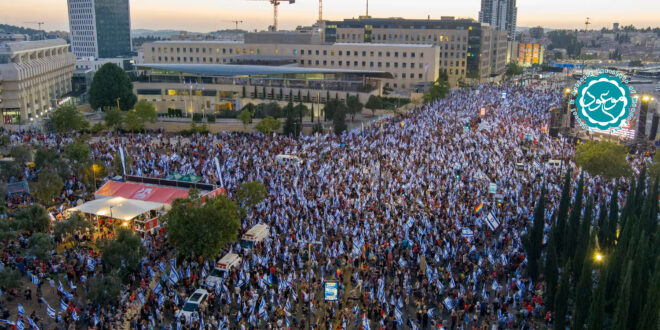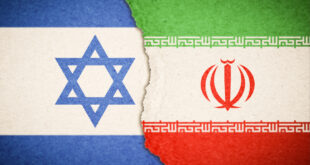According to Mouood, quoting by Guardian:
Israelis defiance of Netanyahu holds a lesson for anyone who cares about democracy
Jonathan Freedland
Mass protests by ordinary people against the man who was Trumpian before Trump are part of a worldwide struggle
Beware the strongman leader who fears jail. Donald Trump is running for president in part because he sees a return to the White House as a literal get-out-of-jail-free card: reinstalled in the Oval Office, he would be able to pardon himself for the mounting pile of serious federal crimes for which he is indicted. His legal strategy is his political strategy.
But the exemplar of the phenomenon is the man who was Trumpian before Trump: the prime minister of Israel, Benjamin Netanyahu. It is Netanyahu – and the war he is currently waging against his own country – whom all those who care about the wider future of democracy should be watching. For Israel has become the test case in the global fight against ultranationalist populism.
On Monday, Netanyahu’s coalition passed a new law curbing the powers of Israel’s judiciary. No longer will the supreme court be able to block the government from taking action the judges deem “extremely unreasonable”. That matters, because in Israel the courts are pretty well the only restraint on government power: there is no second chamber, no established constitution. And Monday’s vote was merely the first in a series of moves designed to gut the power of the judiciary: opponents, who have been out on the streets in huge numbers since January, call it a “judicial coup”.
There are multiple motives in play here, but the crucial one is that Netanyahu is several steps down the road that Trump dreads: he is on trial for corruption. He is due to testify in the coming months, which is sufficiently perilous a prospect that he’s willing to abuse the power of his office to avoid it.
Thanks to the law passed this week, that could mean an attempt either to sack the attorney general or strip her of authority over prosecutions, clearing the way for a new, more sympathetic official who might – purely coincidentally, you understand – decide to review existing cases, before concluding that all charges against Netanyahu should be dropped and the trial halted.
“He can find a way to make it stop,” Dana Weiss, analyst for Israel’s Channel 12, told this week’s Unholy podcast. Of course, that would make a mockery of the rule of law. But, as the New Yorker editor, David Remnick, puts it, Netanyahu “is willing to erode the liberty of his people to insure his own”.
Do “liberty” and the “rule of law” sound a little abstract? Then take a look at Netanyahu’s coalition partners, who gave him the votes he needed on Monday. They consist of ultra-orthodox fundamentalists, nationalist extremists and overt racists, who together make up the most rightwing government in Israel’s history.
Among them is Itamar Ben-Gvir, who in 2008 was convicted by an Israeli court of incitement to racism and support for a terrorist organisation (and who, incidentally, was blamed by Sinéad O’Connor for the death threats that led her to withdraw from a pro-peace concert in Jerusalem in 1997, when Ben-Gvir was just 21). He is now Israel’s security minister, in charge of the police.
Netanyahu may be driven chiefly by the desire to save his skin, but these people are happy to help because an eviscerated judiciary allows them to realise their own dreams. For the ultra-orthodox, the big prize is exemption from conscription into military service, but for Ben-Gvir and his fellow extremist nationalist, finance minister Bezalel Smotrich, who is also in charge of settlement construction, the goal is ever tighter control, if not annexation, of the occupied West Bank.
En route, there are countless steps the far right is itching to take – all of which would make life, already harsh for Palestinians, unbearable.
Of course, the ambition does not end there. The government barely hides its intention to reshape the Israeli political landscape, ensuring the playing field is tilted permanently in its favour. That is why Netanyahu and his ministers are targeting not only the courts but the media, another institution with an irritating habit of holding power to account.
They are keen to funnel public money into the Fox News-style Channel 14, while putting the other, straighter networks under tough new rules, including crippling fines for coverage that fails to meet the government definition of “balance”. The result would be an environment in which the right might never lose another election.
All of this matters to Israelis, to Palestinians and to those Jews around the world who feel themselves bound up with the country and its fate. To fear for the future of Israeli democracy is not to pretend that it was perfect before Netanyahu: how could it be when the occupation of Palestinian territory is now in its 57th year? To quote the slogan of one wing of the protest movement: “Democracy and occupation cannot coexist.” And yet, that cannot be an excuse for inaction: Netanyahu’s judicial coup will make things worse, including and especially for Palestinians.
But it also matters to those who are a long way from Israel-Palestine and have no direct stake in it. For this is part of a wider struggle against what is now, somewhat paradoxically, an international phenomenon: ultranationalist populism.
Those fighting this global battle certainly see it that way. Polish and Hungarian campaigners recognise in Netanyahu’s drive to turn Israel into an illiberal democracy the transformation wreaked in their own countries. Activists have travelled between Warsaw, Budapest and Jerusalem trading lessons, advice and even solidarity videos.
“Tell your people that this must not happen because you might end up like Poland,” urged the country’s former president Lech Wałęsa in a message to Israelis. Meanwhile, Israel’s Haaretz newspaper uses the slogan “Democracy can die in daylight too”, a nod to the Washington Post’s Trump-era motto: “Democracy dies in darkness.” Different countries, same struggle.
Israel is a key test because the pro-democracy movement there has moved faster and more intensively than perhaps any other. For 29 straight weeks, Israeli protesters have filled the streets in colossal numbers. They have not allowed the right to denounce them as unpatriotic: on the contrary, they swiftly co-opted the national flag and made it a symbol of dissent.
They command majorities in the opinion polls and have the support of trade unions and business leaders who, at a critical point, mounted what was in effect a joint strike. Most crucially of all, they have the support of an estimated 15,000 military reservists, including those from elite units, fighter pilots among them, who have either refused, or threatened to refuse, to serve.
In March, this combined pressure succeeded in persuading Netanyahu that he should not stage his judicial coup in a single wave of shock and awe, but should instead salami-slice it, bit by bit. This week, he forced the first slice down the throat of a reluctant Israeli public. In other words, despite massive economic and civil disruption and a mutiny that military officials warn has seriously degraded Israel’s ability to defend itself, Netanyahu went ahead anyway. The tactics had changed, but his pursuit of the goal had not wavered.
That prompts a troubling question for all those engaged in the fight against nationalist populism, wherever they are. If all the strength and numbers Israel’s pro-democracy movement has mustered are not enough, what exactly will it take? Can it really be that a nation is powerless to stop a leader bent on destroying his country to save himself? That thought is almost too bleak to contemplate. Which is why everyone who cares about democracy, including those who are distant from Israel, should desperately want those protesters to succeed. We need them to win.
Jonathan Freedland is a Guardian columnist
 Mouood Mouood English Edition
Mouood Mouood English Edition




